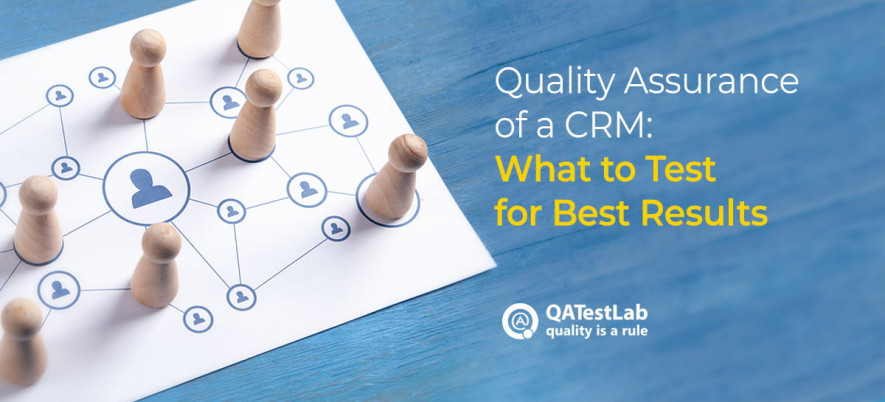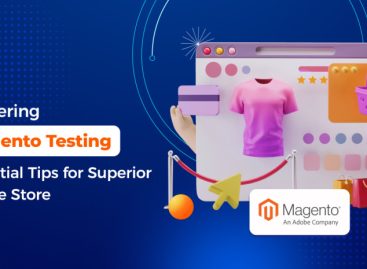- QATestLab Blog >
- QA for Business >
- Industries Insights >
- Quality Assurance of a CRM: What to Test for Best Results
Quality Assurance of a CRM: What to Test for Best Results

Relatively few businesses don’t use customer relationship management (CRM) solutions for processes optimization nowadays. To be able to take full advantage of CRM benefits, though, and for these solutions’ maximum efficiency, software testing is required.
In this article, we will delve into what needs to be tested in a CRM for thorough and effective QA and provide a testing checklist, actionable tips, and practical advice on how to conduct CRM testing for best results.
Data testing
In its essence, a CRM is meant to make working with large amounts of data about customers easier. So it may come as no surprise that testing a CRM usually starts with checking the correctness, completeness, and proper flow of data in the solution.
Some of the things to check during data testing in a CRM are:
- correctness of data in fields
- duplicate records
- accurateness of reports
- missing data
- new data entries
- functions of data search
Tip: When entering test data into a CRM to check how it works, realistic data should be used for reliable test results. For example, one should use real phone numbers, zip codes, and address formats. But additionally, it is also important to use negative scenarios when incorrect information is entered on purpose to check how the system reacts to it. A proper error message should appear.
Functionality testing
A fundamental step in software testing is to check whether an application works according to the requirements. One of the specifics of testing CRM functionality is that proper workflows for various user roles need to be assessed. A QA engineer should also check whether custom configurations have any negative effect on the system’s functionality.
Integration testing
As CRMs are complex systems, robust integration between their various parts is extremely important for the solutions’ proper and efficient work. When testing a CRM, one should check integration between front-end and back-end, different modules, and all the data stored in the solution.
It is also essential to check integration between a CRM and various third-party systems such as other sales and marketing solutions, social media, the company’s websites, and others.
UI and UX testing
A CRM is one of the main working tools for sales and marketing experts – and often other company employees too – that needs to be used on a daily basis. So it is essential that a CRM system is user-friendly and convenient. This does not only affect the end-users’ satisfaction with the solution but also their work efficiency and, consequently, their business revenue. That is why user interface (UI) and user experience (UX) testing are so important when it comes to CRMs.
Some of the things that should be checked during these types of testing include:
- checking if the elements of graphic user interface (GUI) are arranged conveniently and intuitively
- assessing if the UI overall is easy to use and logically structured
- verifying that the navigation in the CRM is clear and smooth
- checking if the content layout is correct
- verifying if an adequate number of usage steps is required to accomplish a certain goal in the CRM
- checking if the CRM complies with the established usability standards
Security testing
Since a lot of sensitive corporate data about customers is stored and accessed over the Internet in CRMs, security naturally becomes one of the most important challenges for these solutions.
Some of the necessary measures to mitigate security risks in CRMs include:
- testing role-based access and different user permissions
- penetration testing to check if the system’s security can be easily breached
- assessment of possible security vulnerabilities
Performance testing
Testing a CRM’s performance allows to verify if the solution’s work is fast, reliable, and efficient, with no lagging or downtime. This type of testing is particularly important for CRMs because they are meant to be actively used by a large number of users at once.
Some of the important things to check when assessing the CRM’s performance are:
- response time
- loading speed
- maximum number of users
Regression testing
CRM solutions are prone to frequent updates, upgrades, and expansions of functionality to meet the end-users’ needs and expectations better. These systems are also complex with various functionality and interconnected parts. This is why there is always a chance that any changes in a CRM can lead to unpredicted negative consequences.
So regression testing after every update, upgrade, or bug fix becomes vital for these solutions. It allows any negative consequences of changes in a CRM to be detected and then fixed early before they can affect the end users.
Compatibility testing
CRMs typically can be accessed through web browsers. So checking cross-browser compatibility to make sure that these systems display and work correctly in all the popular browsers is very important.
Additionally, nowadays, many CRMs have a mobile version too. In such cases, CRM solutions need to be tested on various mobile devices (with different operating systems, brands, and characteristics) through which their end-users are likely to work with these applications.
Synchronization testing
One of the issues that might occur in CRMs is that data can be lost during real-time synchronization with third-party systems. To address this situation, testers should reproduce the sequence of actions to determine the exact point at which the information failed to synchronize. It will help to quickly solve the problem.
Migration testing
Migration to a new CRM or to a different version of the same CRM can present certain challenges. In such situations, thorough testing can help to verify that no data was lost and no issues occurred because of the migration process.
Conclusion
CRM solutions are complex systems with a number of specifics that can make thorough testing challenging. We hope that this article was of help in clarifying the necessary scope of comprehensive CRM testing, as well as providing a testing checklist and some tips on effective QA of CRMs. We wish you happy and successful CRM testing and a top-notch CRM quality.
Should you need more information or any assistance with CRM testing, please don’t hesitate to get in touch. The QATestLab team is always here for you if you need us.
Learn more from QATestLab
Related Posts:
- No Related Posts
About Article Author
view more articles








I agree with you. CRM Software allows you to close more leads in less time with features like data entry automation, smart analytics and business insights etc. And as your business grows, you need tools that help you scale outreach and sales development.
Many brands only care about how to buy their services or products. Customer involvement may occupy the last position in their list of marketing strategies. Customers who feel involved will usually buy, promote, and show their loyalty to one product or brand. Businesses that focus on customer relationship management (CRM) focus more on value creation, not income extraction.
The development of the company takes a lot. Strength, perseverance, hard work. All this is very important, another important aspect is the good management of the company. This can be facilitated by good CRM software. In our company We have implemented Firmao and I can honestly recommend it. It has a lot of useful features to facilitate the conduct of business